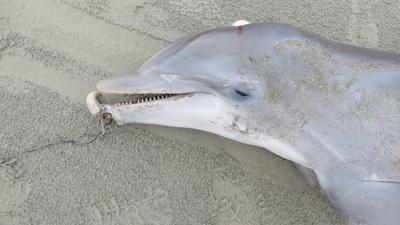A dolphin was found dead on the beach near 21st Avenue on Isle of Palms Tuesday, emaciated, malnourished, and with a length of monofilament fishing line wrapped so severely around its lower jaw that bone had begun to form around it.
“It was a chronic injury that led to infection in that area, which spread to the lower jaw and eventually to the rest of the body,” said Wayne McFee, a wildlife biologist with the National Oceanic and Atmospheric Administration’s National Ocean Service involved with the state’s marine mammal stranding program.
A necropsy revealed the contents of the dolphin’s stomach: some fish and shrimp, and a fishing hook. McFee said the dolphin was 2 to 3 years old, six feet long and by the time it was found had likely been dead for more than eight hours based on its level of decomposition.
New York Times best-selling author, conservationist and East Cooper resident Mary Alice Monroe, posted a picture of the stranded dolphin on one of her Facebook pages, garnering hundreds of shares.
McFee said it will be a few weeks until the results of lab tests clarify exactly what killed the dolphin, but those tests won’t make clear whether the marine mammal ingested the hook and line after they were discarded or while going after bait on a hook while someone was fishing.
Either way, McFee said there are things people can do to prevent such fatal encounters from happening, such as not throwing used fishing gear into the water. “Dolphin friendly” fishing tips from the National Oceanic and Atmospheric Administration also advise checking fishing line for weaknesses before going out so the line doesn’t break and end up in the water that way.
“Marine debris is a growing problem around the world, not just here, and the more we can keep out of our oceans the better,” McFee said.
That includes unused bait, which can attract dolphins to fishing boats, putting them in danger of other threats like propellers as well as baited hooks.
McFee said that in Florida, researchers have found that the dolphins that eat bait off of hooks are used to being fed by hand, meaning that feeding dolphins makes them more likely to put themselves in harm’s way. Feeding dolphins is also illegal under the Marine Mammal Protection Act.
McFee said there were 60 stranded marine mammals in the state last year - a little more than is typical - 54 of which were bottlenose dolphins. Of those, six were the result of human interaction, but most often those are cases where animals get tangled up in buoy lines of crab pots, not monofilament fishing line. On average, he said about 25 percent of stranding cases are the result of human interaction.
As for whether the situation is getting better or worse, McFee said that’s not entirely clear.
“It’s a hard thing to measure,” he said. “It varies from year to year.”
He urged anyone who sees a stranded animal to report it by calling the hotline at 800-922-5431. He also said if the animal is alive, do not push it back into the water.

